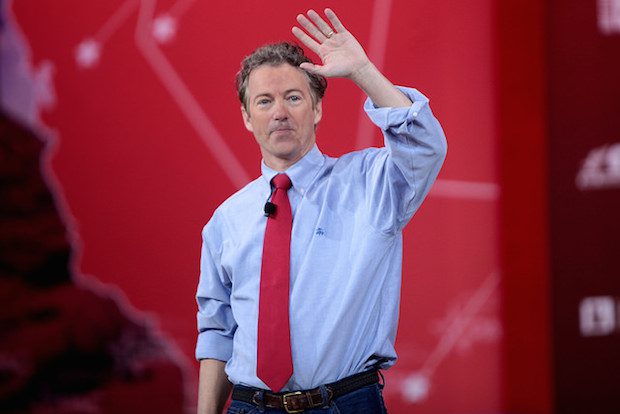Is the Libertarian Moment Over?

Scott Walker’s rapid rise finally seems to have dented Rand Paul’s numbers in the national polls testing who Republicans want to see as their 2016 presidential nominee.
While Ted Cruz and Marco Rubio have fallen behind, as late as mid-February Paul was still in the double digits even in polls showing Walker competitive with Jeb Bush.
Now three national polls—McClatchy/Marist, Quinnipiac and Public Policy Polling—have the Kentucky senator in the single digits. He’s ahead of candidates like Rubio and Cruz, yet in the RealClearPolitics polling average Paul not only trails Walker and Bush but also Mike Huckabee and Ben Carson.
Is the libertarian moment over? More hawkish conservatives certainly hope so.
“I predict Rand Paul will get fewer votes than his father got in 2012,” Bill Kristol said in November. “He’s more dovish than President Obama on foreign policy. Republican voters aren’t.”
One could quibble about what exactly that would prove. Ron Paul is more dovish than his son, so if he got more votes would that mean Rand was too hawkish? The younger Paul is also less likely to stay in the race without a path to the nomination and can’t as easily run for reelection to his current post while seeking the presidency.
But the current polling makes Kristol’s libertarian-baiting prediction appear less outlandish than it did last year. Republican primary voters are concerned about ISIS and giving more hawkish answers to questions about Iraq and Syria, including endorsing boots on the ground.
Paul’s “time seems to be in peace and not at war,” observed leading conservative activist and blogger Erick Erickson after the Conservative Political Action Conference. “We are headed into the foreign policy election I predicted we’d have in 2012.”
“[T]he country is actually willing to trade its freedom for its security, which means Paul is a nonstarter in a time of international tension,” Erickson added. “He makes people feel good. He makes people feel proud. He does not make people feel safe.”
We’ll see. In his CPAC speech and elsewhere, Paul has started working overtime to make the argument that a serious fight against terrorism means avoiding destabilizing Iraq-like wars.
Maybe that argument won’t go anywhere with the older Republican primary electorate, many of whom still are emotionally invested in the Iraq war, but it is winning over some young activists who will help shape the party’s future. Note that Paul edged Walker in the CPAC straw poll, which has limited predictive power for 2016 but is far from meaningless.
Libertarians have think tanks, grassroots organizations, and major benefactors (including the Kochs) that most conservative also-rans lack and which have yet to be fully engaged in the nomination contest. Libertarian-themed books are still making waves on the right. Paul is also building a solid campaign organization.
These groups are still at a competitive disadvantage compared to older and more established conservative organizations, but they are more nimble and effective than when Paul’s father was running. The Kochs, obviously, could be a game-changer if they so chose.
None of that guarantees Paul anything. But it makes him somewhat less likely to fizzle than Carson and puts him in a better position to capitalize on changes in the race’s dynamics than Cruz.
Paul’s biggest problem at the moment isn’t foreign policy, though he can expect the rest of the Republican presidential field to take their shots at him on that issue.
Walker is currently taking a lot of voters who might conceivably be counted on to help Paul expand beyond his libertarian base. Meanwhile, many social conservatives are backing candidates like Huckabee and Carson.
Is there anything that Paul–who still generally seems to have solid numbers in Iowa and New Hampshire–can do about this? Walker is a lot harder to run to the right of than Bush.
The race seems fluid. There is no overwhelming frontrunner and no guarantee that even leading candidates like Walker and Bush can sustain their current momentum, much less Carson, Huckabee or Chris Christie.
That’s of course an argument for supporters of Cruz, Rubio, and even candidates like Bobby Jindal or Rick Santorum to have hope. While Republicans seldom nominate lesser known candidates, one such contender always seems to break into the top tier during the primaries.
Look at how many different candidates led in Iowa in 2012.
The Republican Party may yet have a real fight on its hands.
W. James Antle III is managing editor of the Daily Caller and author of Devouring Freedom: Can Big Government Ever Be Stopped?
Comments